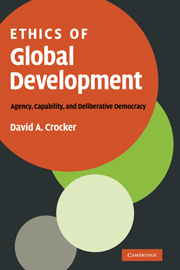Book contents
- Frontmatter
- Contents
- List of figures
- Acknowledgments
- 1 Introduction
- Part I Development ethics
- Part II The capability approach: ethical foundations
- 4 Critique of alternatives
- 5 Agency, functioning, and capability
- 6 Evaluating capabilities and functionings
- Part III Strengthening and applying the capability approach
- Part IV Deliberative democracy, participation, and globalization
- Index of names
- Index of subjects
4 - Critique of alternatives
Published online by Cambridge University Press: 22 September 2009
- Frontmatter
- Contents
- List of figures
- Acknowledgments
- 1 Introduction
- Part I Development ethics
- Part II The capability approach: ethical foundations
- 4 Critique of alternatives
- 5 Agency, functioning, and capability
- 6 Evaluating capabilities and functionings
- Part III Strengthening and applying the capability approach
- Part IV Deliberative democracy, participation, and globalization
- Index of names
- Index of subjects
Summary
In the three chapters of Part II, I analyze, evaluate, and begin to strengthen the ethical dimensions of the capability orientation to international development. The two leading practitioners of this orientation – Amartya Sen, its originator, and Martha Nussbaum, an important proponent – have made novel and influential contributions to the several dimensions of a development theory‐practice, which I distinguished in Chapter 3. Their development ethics are situated, as such ethics should be, in the context of dialectical interaction with other elements of a development theory‐practice. These include the conceptual definition and empirical investigation of development as well as policy recommendations for achieving development and overcoming underdevelopment. What we view as worth promoting, as intrinsically valuable, will make a difference in both causal analysis and policy recommendations. One reason for the importance of these two versions of the capability orientation is that they fruitfully link, without confusion or fusion, those elements in development theory and practice that have been unfortunately and even disastrously separated.
My concern in this and the next two chapters, however, is with the way in which Sen and Nussbaum answer many of the fundamental ethical questions related to development, questions that I identified and discussed in Chapter 2. In the present chapter I analyze, compare, and evaluate how Sen and Nussbaum criticize alternative ethical perspectives: commodity approaches, utilitarianism, and basic needs.
- Type
- Chapter
- Information
- Ethics of Global DevelopmentAgency, Capability, and Deliberative Democracy, pp. 109 - 149Publisher: Cambridge University PressPrint publication year: 2008

